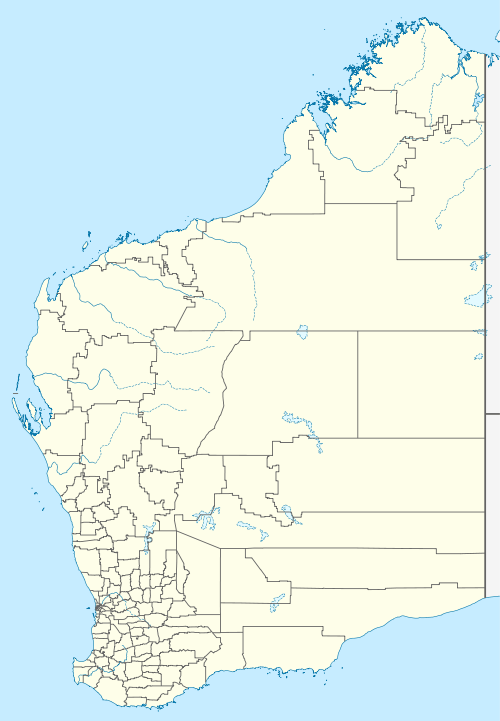Koolyanobbing, Western Australia
Koolyanobbing is located 54 km (34 mi) north-northeast of the town of Southern Cross, Western Australia. A subsidiary of Cliffs Natural Resources of Cleveland, Ohio mines Iron ore here. The ore is railed to the port at Esperance for export. Current operations commenced in 1993. The current owner and operator of the lease is Mineral Resources Limited (MRL) who took over from Cliffs Natural Resources in July 2018.
| Koolyanobbing Western Australia | |
|---|---|
 Koolyanobbing | |
| Coordinates | 30.82°S 119.52°E |
| Population | 258 (2006 census)[1] |
| Established | 1965 |
| Postcode(s) | 6427 |
| Elevation | 343 m (1,125 ft) |
| Location |
|
| LGA(s) | Shire of Yilgarn |
| State electorate(s) | Eyre |
| Federal Division(s) | O'Connor |
History
The first European to visit the area was Charles Cooke Hunt in 1864 who explored the Koolyanobbing range that is situated nearby.
The next European to visit the area, in 1887 and later in 1891, was a gold prospector named Henry Dowd, who thought that the rocks in the area were of no value. He recorded his findings and stored them in a bottle that was buried next to a survey peg and which was found again in 1963 at what is now known as Dowd Hill.[2]
Iron ore was first mined at Koolyanobbing from around 1950. It was sent by truck to Southern Cross from where it was shipped by rail to Wundowie, where there was a state-owned blast furnace.[3]
The town was established to service a new iron ore mine in the 1960s at Dowd Hill. The town was gazetted in 1965.[4] The former Eastern Goldfields railway between Southern Cross and Kalgoorlie was realigned for change to standard gauge, and to service the Koolyanobbing mine.[5]
The name is of local Aboriginal origin, meaning "place of large rocks."[6] Dampier Mining Co Ltd, a subsidiary of the Broken Hill Proprietary Company Limited (BHP), mined iron ore between 1967 and 1983. Ore was shipped by rail to Kwinana, near Perth, to supply Australian Iron and Steel's (also BHP) blast furnace. The closure of the Kwinana blast furnace in 1982 resulted in suspension of iron ore mining at Koolyanobbing until 1993.
WA Salt Supply produces salt at Lake Deborah, 20 km (12 mi) to the north, which is railed from Koolyanobbing to Kwinana.[7]
The Koolyanobbing Range supports many endemic, priority and one declared rare flora species.
Rail services
The Prospector service, which runs each way between East Perth and Kalgoorlie once or twice each day, stops at Koolyanobbing.[8]
See also
- Transwa Prospector § Stops
| Preceding station | Following station | |||
|---|---|---|---|---|
| Southern Cross towards East Perth |
Prospector | Bonnie Vale towards Kalgoorlie | ||
References
- Australian Bureau of Statistics (25 October 2007). "Koolyanobbing (State Suburb)". 2006 Census QuickStats. Retrieved 20 September 2008.
- "Shire of Yilgarn - Tourism - Koolyanobbing". 2007. Archived from the original on 28 August 2008. Retrieved 20 September 2008.
- Relix & Fiona Bush Heritage and Archaeology. "WUNDOWIE CONSERVATION PLAN" (PDF). p. 15.
- Western Australian Land Information Authority. "History of country town names – K". Retrieved 20 September 2008.
- Western Australian Government Railways Commission. Railway Standardisation Agreement (Western Australia) no. 67 of 1961. Matters involving variation of the Agreement and requiring Commonwealth approval as at 10 August 1963. This variation to contract resulted in a route change that took the Standard gauge railway from Kalgoorlie to Perth via Koolyanobbing then Southern Cross. http://henrietta.liswa.wa.gov.au/record=b2269846~S2
- Boyle, Bronwyn, "Do or die for Koolyanobbing", The Wheatbelt Mercury, 27 November 1991, p. 12-13
- "WA Salt Supply". Archived from the original on 15 January 2010. Retrieved 10 January 2010.
- "Prospector Timetable" (PDF). Transwa. Public Transport Authority. Archived (PDF) from the original on 18 June 2020. Retrieved 28 June 2020.